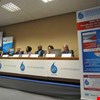


Strategic financial planning is a means to assess financing needs and match them to financing sources in a structured way to fill the gap in funds over a period of time based on different future scenarios. An approach to strategic financial planning for the water supply and sanitation sector called FEASIBLE has been developed by the OECD. It was applied with support from the GWP-hosted EUWI-FWG and the ACP-EU Water Facility in Lesotho during 2008-2010.
On World Water Day 22 March 2012, it was announced that a close partner organization of GWP, the International Water Management Institute, wins this year's Stockholm Water Prize “for for their pioneering research that has served to improve agriculture water management, enhance food security, protect environmental health and alleviate poverty in developing countries.”

Dr. Ania Grobicki, GWP Executive Secretary, speaking at a World Water Day press conference at the United Nations in New York, called on governments to recommit to IWRM and Water Efficiency Plans at the Rio+20 Conference in June 2012. Governments agreed to such Plans in Johannesburg, South Africa, known as the Johannesburg Plan of Implementation, at the World Summit on Sustainable Development (Earth Summit 2002).

International World Water Day is held annually on 22 March as a means of focusing attention on the importance of freshwater and advocating for the sustainable management of freshwater resources.
The International Roundtable on Protection and Sustainable Use of Transboundary Waters in Southeastern Europe was held on the 15th and 16th of December 2011 in Zagreb, Croatia.
To initiate water resources management for further sustainable development in the Nam Ngum River Basin and to present / identify step forward for Nam Ngum river basin demonstration project implementing on integrated water quality management involving stakeholders as well as provinces, districts and local communities are the objectives of the workshop.

International World Water Day (WWD) is held annually on March 22nd as a means of focusing attention on the importance of freshwater and advocating for the sustainable management of freshwater resources.

We would like to collect feedback from those of you who use GWP’s IWRM ToolBox to learn what needs to be improved and how.

The 6th WWF was taken place on March 12 to March 17, in Marseille, France. The delegation of GWP China which was formed with four members and led by Dong Zheren, the Standing vice Chair of GWP China participated in the forum.

This publication was launched at the 6thWorld Water Forum in Marseille by the International Network of Basin Organizations (INBO), the Global Water Partnership (GWP), UNECE, UNESCO, GEF, EVREN and AFD who worked together to produce it.